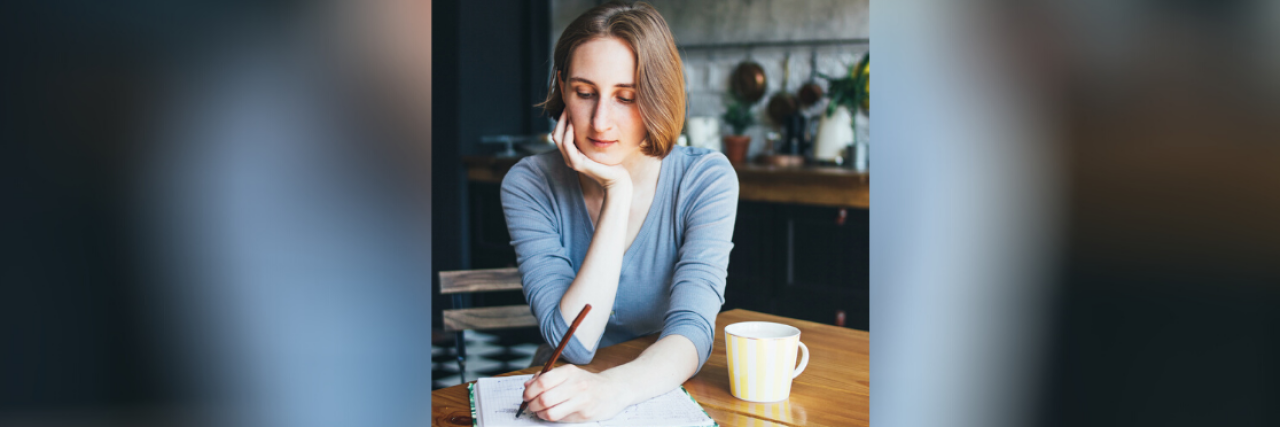Being with your own thoughts can be good thing. Letting the thoughts flow through your mind reveals some of the things you tackle in the deepest, darkest corners of your consciousness. Sometimes, these thoughts scare you. Other times, these scary thoughts can actually help you to tackle some of your own personal challenges.
Before I continue, I want to make something clear. I am so grateful for the career I have had and continue to move forward in. I’m grateful for the opportunities that present themselves and I’m grateful for the support around me.
But over the past few years, I feel I’ve lost my identity. I have no idea who I am anymore. Plans that I once had have gone. I get asked “where would you like to be in five years’ time?” and I honestly couldn’t tell you.
Those closest to me know what my dream career would be. I had neuroblastoma of the spine and stomach at 4-months-old; then around the age of 7 I made the complicated decision to use a wheelchair. I was constantly tired and weak, so it was the best decision at that time. If things had been different, I would of liked to become a paramedic.
There are certain things paramedics are required to do that aren’t feasible in a wheelchair. Saying that, there are so many different things I’ve achieved since choosing to use a wheelchair. These include sporting achievements, graduating from university and working.
But the question I ask myself is if I am grateful for the life I have now, why do I feel like I’m pining after something which isn’t going to happen? Why do I feel like there are different versions of me, but I can only ever be one? Why do I feel like this after being in a wheelchair for almost 20 years? Surely I have absolutely no right to feel like this, especially after so long?
My parents brought me and my brother up with the realization that you can do anything you put your mind to. They taught me that with strength, determination and willpower, you can achieve great things. This is true. They continued (and still do) to remind me of this during the numerous hospital admissions, incidents of bullying and belittling, mental health breakdowns and traumatic events that have occurred over the years. They’ve taught us to be positive no matter what happens in life. This is something I will always continue to try and do; but as we all know, it is not always easy.
I’m awaiting support for my mental health, but no one knows where to signpost me to. I’m on tablets for anxiety and depression and I’m awaiting support for post traumatic stress disorder (PTSD) amongst other things. In addition, I don’t really sleep well (when I do fall sleep, I often get nightmares about things that have happened). Interestingly, when I actually do sleep and dream, I am never in a wheelchair. This is apparently normal. It’s not a bad thing in my eyes, it’s just different.
A psychologist once told me that even though I don’t remember the treatment due to my age, my subconscious remembers it and so does my body. She made some valid points that maybe I hadn’t admitted, focusing around future life plans such as being unsure if I can have children as a result of the chemotherapy and managing the
progression of certain conditions.
But why do I feel guilty for surviving in the first place? Why did I survive having neuroblastoma, yet my friends didn’t? Why was I given a chance when their chance was ripped away from them? Why am I not making the most of this anymore?
“Be thankful that you’re alive.”
“You shouldn’t feel like this, you were too young to remember treatment.”
“You survived. Be grateful.”
Of course I am thankful.
Whilst remaining thankful for these things, I have also come to realize that feeling like this is normal in this situation. It doesn’t make it easier, but it’s OK.
You do not have to be strong all of the time. It’s exhausting.
You do not have to be OK all of the time.
Things do not need to make sense all of the time.
So here are a few things that I’ve realized:
Sometimes, everyday things might trigger some memories you would rather forget. For example, every day I look in the mirror and I remember an incident at school where I was bullied for the color of my teeth. They are not pearly white as a result of chemotherapy and I’ll always be self-conscious of them… so self-conscious in fact that I always carry around a toothbrush and toothpaste with me everywhere I go. This includes going to a friends house, at work during the day and out and about on day trips. I’ve accepted this is just one of the “odd” things I will do and that I shouldn’t worry about other peoples judgment on this or anything else.
Plans change. They won’t work out every single time. Sometimes, better things might fall into place. Always look at how far you have come. This will be more difficult some days; but other days, you’ll see just how wonderful you really are. In order to keep going, I have tried to make another bucket list of things I would like to do in life (I’m a bit of an adrenaline seeker, my poor mother).
People change. You can’t control what people think and feel, but you have some control over how you react to things and how kind you are to others.
The emotional and physical pain will always remain. Maybe I’ll feel better or maybe I won’t. It’s about finding a way forward to deal with that.
Telling someone that you are not OK is not a sign of weakness. I keep things bottled up (like most people). This isn’t always the best way as it always ends up coming out in an explosive episode.
Not everyone will understand what you struggle with and why. That is OK, you can’t expect everyone to understand you or to help you. Everyone has their own struggles.
Some of the things I think, feel and do are common in childhood cancer survivors who are struggling with their mental health. In a way, this is actually reassuring because it shows that the struggle is real, it is valid and you’re not alone. There are some wonderful groups on social media and in this day and age, more and more research is being carried out with regards to suicide attempts and PTSD in childhood cancer survivors. Sometimes, physical or emotional scars are not always obvious nor are they always talked about.
Sometimes, it’s OK to let your guard down and remove your “mask.”
Being in a wheelchair doesn’t stop you. If anything, it enables you to do things. It’s not a “disabler,” it’s an “enabler.” I’ve completed the Level 3 First Aid course and also helped in several medical emergency situations, which required urgent first aid.
Switching your phone off now and again is actually a really effective way of bringing yourself to focus on your own wellbeing. Sometimes, social media and group messages can get a bit overwhelming. Switching your phone off at certain points in the day might actually help.
I have a dedicated time during the day which I use to get all the menial tasks done. I call this my “worry time.” Sounds a bit silly, but it’s actually useful. During this time, I focus my undivided attention on responding to things that might cause me to worry a little bit for whatever reason, such as a difficult work email, paying a bill or making that challenging phone call. Once this is over, I then try not to focus on it until my next scheduled time.
In addition to this, I have a work calendar. When I use it, I set up the tasks for the day in the calendar so I can see it nice and clearly. I then rank the tasks based on how much energy I might need to use. So red means I need a lot of energy and should prepare properly beforehand then rest for 10 minutes after, yellow means I need a reasonable amount of energy so I should prepare a bit beforehand then rest for five minutes after and green means I need to use very little energy to get these tasks done. I therefore try and spread out my tasks based on how I feel that day. Inevitably, some things you can’t put off until the next day so it’s about adapting to what you feel you can achieve and do.
In my previous role, I would deliver tutorial sessions to young people aged between 16 and 18. Some sessions would be quite intense (such as the topic being covered, managing the behavior of the class and the activities involved for that session) and others would require a little less input or energy usage. Being able to prepare for that in advance saved me quite a few times (as well as having some amazing colleagues and curriculum teams as support too). I’ve moved jobs, so I hope to adapt this technique into my new role too.
Finding something that you enjoy doing is vital. I gave up a sport last year due to health issues and circumstances. In terms of keeping fit, I am happy exercising at home right now until I am ready (physically) to get back into some sport.
Having a structure to your day is important (thanks mum and dad). I will be honest and say I’ve still not mastered this properly during lockdown but I’m trying to exercise more, find time to read a book, draw, color… whatever takes my fancy.
I’ve also tried to write a bit more comedy. I took part in a comedy show last year for a cancer charity here in the UK. Since lockdown, I’ve been writing more about some of the things that happen. In addition, I’ve become a bit more motivated to writing about the challenges in a funny manner since I had dinner with a stranger (that’s a different story which I will talk about another time). There is always something funny to talk about.
I felt the need to write this in case there is anyone else out there who might be feeling something similar, no matter the difference in our situation. Please remember that you are not alone.
Getty image by Galina Zhigalova


